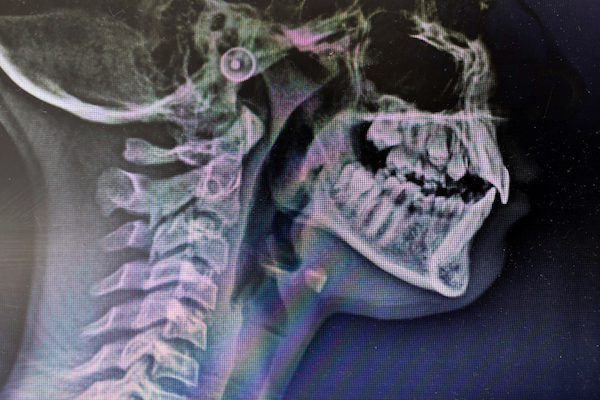TMJ Treatment
Diagnosis and Treatment

TMJ Treatment Cabramatta
Temporomandibular Joint Disorder, or TMJ, is a group of symptoms affecting the jaw joint, which is the joint that links the lower jaw to the skull.
In addition to causing severe headaches and facial pain, TMD can affect the jaw’s ability to operate normally.
Temporomandibular disorders can be divided into three groups:
- Myofascial pain, the most typical type of TMD, is characterised by discomfort or pain in the neck and shoulder muscles and the muscles that control jaw function.
- Internal derangement of the joint refers to a misplaced disc, dislocated jaw, condyle damage, etc.
- Degenerative joint disease, for instance, jaw joint rheumatoid arthritis or osteoarthritis.
Symptoms of TMJ Disorders
- Radiating discomfort in the shoulders, neck, face, or jaw
- When chewing, speaking, or expanding your mouth wide, there may be pain or tenderness near the ear.
- Stiff jaw muscles, or jaws that get stuck or locked
- When opening or closing your mouth, you hear grating, clicking, or popping noises in your jaw joint.
- Discomfort or difficulty chewing results from a shift in how your lower & upper teeth fit together
- Experiencing fatigue in the face
It’s crucial to remember that TMD can also result in earaches, hearing issues, toothaches, and in some circumstances, melancholy. According to experts, no two TMD patients will have identical symptoms and pain, which makes a proper diagnosis more difficult.
Causes of TMJ Disorder
The Temporomandibular Joint (TMJ) moves in both an up-and-down hinge motion and a side-to-side sliding motion to operate. Unusual wear and tear or extreme tension might harm the TMJ.
The jaw ligaments may be too stretched; as a result, the articular disc may be displaced, or the jaw muscles may be overworked.
TMD's most typical causes include the following:
- Poor occlusion, often known as a bad bite, is brought on by an uneven or misaligned “bite.”
- Abnormal position of the head and neck (which may itself be the result of some accident or injury)
- Poor nutrition and poor dental hygiene, as well as cartilage damage caused by illnesses such as rheumatoid arthritis
- Teeth grinding, gnashing, or clenching (Bruxism)
- External injuries like a head injury, a severe fall, or the impact of a car accident
- Bad chewing habits include stuffing your mouth with food, crunching ice or complex items, or consuming foods that require a lot of chewing.

Treatment for TMJ Problems
Although there is no known treatment for TMJ disorders, there are specific options that could significantly lessen your symptoms.
Your dentist in Cabramatta might suggest one or more of the following procedures:
Prescription
Apply moist heat to relieve muscle spasms and pain, or take a prescription like aspirin, muscle relaxants, or other over-the-counter pain relievers or anti-inflammatory treatments.
Wear protective appliances
Using a protective nightguard or splint lessens the harmful effects of teeth clenching and grinding.
Relax
Controlling jaw muscle tension may be possible using relaxation techniques. Your Cabramatta dentist might advise you to get counselling or training to reduce stress.
TMJ Treatment in Cabramatta
If you notice any preceding signs or believe you may have TMJ disorders, don’t hesitate to contact your Cabramatta dentist today!
At Cabramatta Dental Care, we take a gentle and meticulous approach to looking after our patients.
Visit your Cabramatta dentist today!
For TMJ treatment in Cabramatta, call (02) 9755 5300 or request an appointment online.
We are located at 47 Arthur St in Cabramatta.
FREQUENTLY ASKED QUESTIONS
Is there a way to prevent TMJ disorders?
- Massage the muscles in your jaw, cheekbones, and temples frequently.
- Avoid chewing gum or biting on rough items like pens or fingernails if you occasionally get jaw pain.
- Eat soft, mushy foods instead. When yawning, hold your lower jaw in place with one hand.
- When eating, take smaller bites.
- Maintain a supportive neck position as you sleep.
- Apply moist heat if you feel spasms.
- When taking calls, avoid placing your phone between your shoulder and neck.
- Consult your Cabramatta dentist if you often clench your jaw or grind your teeth at night.
What is the difference between TMJ and TMD?
TMJ is the temporomandibular joint, which connects the lower jaw to the skull.
TMD, or Temporomandibular Disorders, occurs when the temporomandibular joint is afflicted by issues that cause discomfort or pain.
What does TMJ pain feel like?
A hurting jaw commonly characterises TMJ pain, but you may also have severe or throbbing neck pain, ear pain, face pain, jaw pain, throat pain, or unexplained headaches.
TMJ disorders can cause symptoms comparable to lockjaw, making it difficult to speak or chew.
